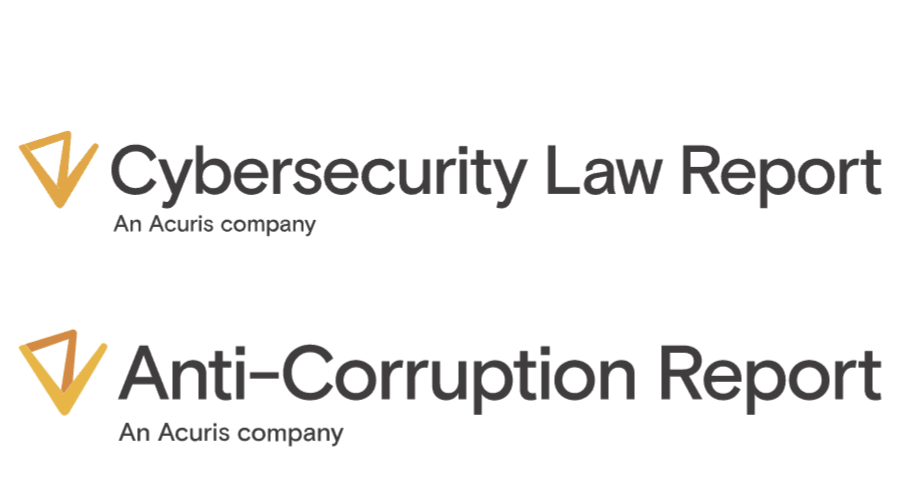Women to Watch: Contributions, Achievements and Observations of Outstanding Female Professionals – Part III
In honor of International Women’s Day, various women at ION Analytics, including Jill Abitbol at Law Report Group, Marlene Star at Mergermarket and Dealreporter, and Sara Tapinekis, Madalina Iacob, Dawn Grocock and Lucy Monteiro at Debtwire, interviewed outstanding women in their respective jurisdictions and the markets that we cover. It is our honor to highlight these women and their accomplishments and contributions to the field, and share some of their insights and perspectives. These lawyers, advisors and consultants from around the world specialize in private equity, restructuring, mergers and acquisitions, hedge funds, anti-corruption, data privacy and more. We hope these remarkable women inspire you as much as they do us.
In this part, Jill Abitbol, Managing Editor of the Cybersecurity Law Report and Anti-Corruption Report, spotlights notable women in the data privacy, cybersecurity and anti-corruption law fields.
Christina Montgomery
Vice President and Chief Privacy & Trust Officer – IBM

Christina Montgomery is vice president and chief privacy & trust officer for IBM, overseeing the company’s privacy program, compliance and strategy on a global basis, and directing all aspects of IBM’s privacy policies. She also chairs IBM’s AI ethics board, a multi-disciplinary team responsible for the governance and decision-making process for AI ethics policies and practices. During her tenure at IBM, Christina has served in a variety of positions including managing attorney, cybersecurity counsel and, most recently, corporate secretary to the company’s board of directors. She is a member of the U.S. Chamber of Commerce AI Commission and the U.S. National AI Advisory Committee.
What are the biggest changes you’ve seen since you started in the industry?
Throughout my career at IBM, I’ve held positions where I’ve been able to see first-hand some of the biggest tech advancements and innovations that are transforming the way we live and work, most recently generative AI. One big change I see in the industry right now is that, with the proliferation of generative AI, there is a new focus on balancing safety with innovation.
Companies across all industries are looking to prioritize safety in ways that allow them to take advantage of the benefits of technologies like AI, while also ensuring proper guardrails and governance are in place to mitigate risks. This renewed focus is a step in the right direction and will help companies align their practices with the evolving landscape of AI regulation. It’s the reason why IBM created watsonx – to house AI tools and enforce governance and compliance, all in one place.
What do you see as the most notable issue or trend right now in the industry, and do you recall what a big issue or trend was when you started out?
It’s truly an exciting time for AI – we’re already seeing the tremendous potential the technology has to help us build a better future and power progress.
The newest “trend” I see is companies and governments alike recognizing that emerging technology like AI needs to have risk-based rules and regulations to protect against potential threats. Governments will build trust in technologies and support innovation and AI adoption if they regulate based on risk, context and how a technology is used, rather than attempting to regulate the algorithms themselves.
However, we can’t rely solely on regulations. Companies play a big role in ensuring the safe and responsible creation and deployment of AI systems. Those developing AI, whether the government or businesses, must be accountable for the technologies they create and deploy. We’ve long advocated for companies to implement AI governance across the AI lifecycle to ensure the technologies they build and use are explainable, transparent and fair.
Another trend I’m seeing is a renewed focus on data, especially with the growing use of generative AI systems. Access to quality data is essential for innovation, yet responsibly sourcing, managing and using that data has never been more critical to protect user safety and generate trust in commercial products. My experience at IBM, including my role as an attorney supporting cybersecurity and now dealing with evolving privacy and AI regulations, has emphasized the importance of establishing strong internal data governance practices. Despite the changing landscape, our commitment to our principles of trust and transparency has remained steadfast. Having a comprehensive governance framework that includes data governance is a critical step that all organizations should prioritize.
Women have made tremendous strides in our industry over the past 20 years. What would you like to see more of for women, professionally?
Nearly a century ago, IBM CEO Thomas J. Watson, Sr. made “respect for the individual” a core tenet at IBM. He believed deeply that women could exert wide influence on industrial, social, educational and cultural institutions and could also bring substantial value to his fast-growing company through a diversity of skills and perspectives. As a result, IBM became a leader in addressing the gender gap.
Looking to the future, I would like to see women in the privacy, AI and emerging technologies spaces get the recognition they deserve for their immense contributions to the industry. Women across academia, industry and government are developing advanced AI systems that are based on ethics, responsibility and governance – from people like Dr. Fei Fei Li at Stanford University, to Lila Ibrahim at DeepMind, to Joy Buolamwini of the Algorithmic Justice League, to my own colleague Francesca Rossi here at IBM, just to name a few. The industry as we know it would not exist without the contributions of all these incredible female leaders.
To support women and reach true equity in STEM more broadly, companies must focus on not only recognizing the problem but also acting boldly toward inclusivity and gender equality.
Leslie Shanklin
Partner – Proskauer

Leslie Shanklin is co-head of Proskauer’s global privacy & cybersecurity group, a partner in its corporate department, and a member of its technology, media & telecommunications group. Prior to joining the firm, she led global privacy teams for media and entertainment companies for over a decade and most recently served on the privacy leadership team for Warner Bros. Discovery. Her practice focuses on privacy and data security, delivering comprehensive expertise around data-related risk and compliance.
What are the biggest changes you’ve seen since you started in the industry?
Data privacy is now a core component of business strategy and operations across organizations at all levels, and it is a topic very much on the minds of organizational leadership. Generally speaking, it is no longer the lone privacy lawyer fighting to get attention on, and resources available to manage, the growing risks around data in their organizations – there really has been a cultural shift toward thinking about data privacy in every component of business operations. While companies are in varying stages of this journey and maturing their privacy programs, overall it is a monumental shift in focus and awareness.
What do you see as the most notable issue or trend right now in the industry, and do you recall what a big issue or trend was when you started out?
While so much has changed in the world of privacy in the past 20 years, in many respects some of the big picture issues and trends are still much the same. Consumer fears about the privacy of their digital lives that were starting to get expression in the media back then with the growing awareness of digital tracking and data breaches still resound today. The focus on cookies and ad targeting has continued, expanding alongside the evolution of tracking technologies and consumer platforms, but the core issues are the same. There’s a lot of focus now on privacy issues presented by AI, and focus will undoubtedly shift again as new technologies outpace privacy regulation and organizations struggle to adapt and scale their privacy programs to keep up with the ever-increasing complexities of managing their personal data. One trend that is newer – in the past five years or so particularly – is the focus on building privacy enhancing and operations technologies. It’s a burgeoning industry and a very welcome one – privacy professionals need tools to manage individual privacy that are as sophisticated as the tech collecting and processing data, and I see a silver lining in AI in this regard. AI at large presents a host of privacy challenges, but it can also be leveraged to power more efficient, accurate tools to manage privacy operations and privacy enhancing tech.
Women have made tremendous strides in our industry over the past 20 years. What would you like to see more of for women, professionally?
Alongside the growing number of women in IT, digital engineering, information security and other tech operations inside of organizations, I would like women to play a growing role in privacy technology development and implementation. More women-owned privacy tech businesses would be great to see, as there is so much opportunity in this space. And I would love to see more women faculty teaching privacy courses in law school. I see law school curricula as sorely lagging behind the growth of the industry in general, and more women teaching in the space with fluency in both the law and the technologies that collectively challenge and protect data privacy would inspire new generations of female lawyers.
Palmina M. Fava
Partner – Vinson & Elkins

Palmina M. Fava is a partner in the New York office of Vinson & Elkins, the co-head of the firm’s global white collar defense and government investigations practice group, a leader of the firm’s cyber security and data privacy practice group, and a member of the firm’s technology and Latin America task forces. Palmina specializes in corporate and government investigations, compliance program design and implementation, and litigation.
What are the biggest changes you’ve seen since you started in the industry?
The biggest change from a representation perspective is the number of women lawyers outside of the U.S. Women have made meaningful progress in Latin America, the Middle East and Africa, and their efforts show no signs of slowing. Somewhat recently, I handled a fairly high profile case in South Africa where the barrister and local counsel were women, my client’s general counsel and president were women, and the judge was a woman. That was not my experience – in the U.S. or outside the U.S. – 20 years ago. In fact, in many of my initial trials, I was the only woman attorney in the room.
What do you see as the most notable issue or trend right now in the industry, and do you recall what a big issue or trend was when you started out?
In my first few years of practice, I addressed novel issues related to establishing jurisdiction over internet sales, protecting data/trade secrets from misappropriation or theft, and building compliance programs. These trends derived from different market factors. The internet was growing not just for communication but for commercialization, thereby requiring courts to adapt to protect consumers. A competitive economy resulted in employee migration between competitors and efforts to shortcut R&D by using a competitor’s trade secrets, which were “acquired” through its former employees or other means. And then, with the increasing globalization of the economy and the financial crisis, legislation compelled a focus on proactive compliance monitoring of global operations. Some of those trends persist today but with a new twist. Cybersecurity incidents could result in the publication of sensitive corporate information, including trade secrets, thereby requiring companies to implement and monitor vigilantly their control mechanisms to detect anomalous behavior. Increasing regulations around sustainability, data privacy and labor require companies to evaluate not only their business practices, but also those of the third parties with whom they do business around the world.
Women have made tremendous strides in our industry over the past 20 years. What would you like to see more of for women, professionally?
When I graduated from law school in 1997, I was told to expect great strides in law firm partnership and C-suite representation within 10 years because women represented roughly half of the law school graduates at that time. Yet the percentage of women partners in Big Law is relatively unchanged 25 years later, and the percentage of women partners in the highest compensation tier at large law firms remains quite low. So I would like companies and law firms to ensure that business development opportunities and support are available to, and utilized by, a diverse group of attorneys to increase representation in leadership, partnership success and compensation. Look seriously at the issue and make meaningful change now. For example, are women invited to lunches, dinners, drinks, sporting events, client pitches and presentations with clients, firm leadership and other key stakeholders with the same frequency as men? Are business development events designed to maximize participation by a diverse group of attorneys – a group best served to grow the client relationship? Are women carrying a larger load of thought leadership, mentorship and administration, yet not recognized for the value each brings to the organization?
A few years ago, I attended a presentation at which a law firm’s managing partner discussed all of the ways the firm was advancing women and the importance of diversity in leadership. The day after that panel, in the same conference room, that firm sponsored a discussion about trends in the legal industry for a select group of the firm’s clients. The panel did not include a single woman partner even though the firm had women partners of the same seniority and experience as the male partners on that topic; indeed, the firm had a woman partner in the New York office who specialized in the subject, and they asked her to invite her clients to the event, yet they promoted a male partner from another office on the panel. Firms must be more conscious of the practices that advance one group and ensure equal opportunity and consideration. Women deserve to be in more leadership roles within companies and law firms and on boards. And they should be given the benefit of the doubt – enjoyed by their male counterparts – to grow into a new role, based on the character traits and skills they demonstrated in other roles.
Alexandra Ross
Senior Director, Data Protection, Use & Ethics Counsel – Autodesk, Inc.

Alexandra Ross is senior director, data protection, use & ethics counsel at Autodesk, Inc. where she provides legal, strategic and governance support for its global privacy, security, data use and trusted AI programs. She is also an advisor to BreachRx and a member of Women Leaders in Data & AI.
What are the biggest changes you’ve seen since you started in the industry?
Well, when I started in the industry, there was mainly a focus on cybersecurity and only a little on privacy more generally. Since then, we have seen enormous changes in data and technology, upheaval in the scope of global privacy and data protection regulation, and increased user awareness of the consequences of misuse of their data. More recently, we’ve started to see more transparency from companies and a focus on trust. We’re also seeing how privacy and security compliance impacts ESG – with more reporting requirements globally as well as investor and customer expectations for disclosures around corporate data governance.
What do you see as the most notable issue or trend right now in the industry, and do you recall what a big issue or trend was when you started out?
AI is the most notable issue I see companies and my peers grappling with. How do we encourage innovation and development while maintaining compliance with current and upcoming AI regulations. How do we build responsible AI programs leveraging foundational privacy and data protection programs, processes and policies? It’s (still) all about the data. Privacy and data protection leaders are well positioned to guide global AI governance programs and build upon organizational structures, frameworks, risk assessment and vendor management programs. There are specific areas related to AI, such as bias, conformity assessments and audits, that may require additional technical expertise or specialized external resources to enhance AI governance.
Women have made tremendous strides in our industry over the past 20 years. What would you like to see more of for women, professionally?
I’d like to see continued representation and inclusion of women in technology, especially in leadership roles and the development of AI, which will benefit from diversity of perspectives. This can include more opportunities, training and dedicated mentoring to encourage women to enter and stay in this profession.
Lucinda Low
Senior Counsel – Steptoe

Lucinda Low’s practice focuses on transnational dispute resolution, particularly international arbitration, white-collar defense and compliance matters with an international character, and matters involving the international financial institutions. In the field of international arbitration, Lucinda serves as counsel, expert and arbitrator. She was named to the roster of arbitrators of the International Centre for Settlement of Investment Disputes in 2017 by the World Bank president, and previously named by the United States as a member of the panel of Conciliators. Her white-collar practice includes representing audit committees, boards of directors, companies and individuals in internal, government, and international financial institution audits, investigations, and enforcement matters involving fraud, bribery, corruption, money laundering and other international regulatory compliance issues. She has deep experience in matters involving the Foreign Corrupt Practices Act and other anti-bribery and anti-corruption laws, as well as other international business compliance issues.
What are the biggest changes you’ve seen since you started in the industry?
In my view, they involve technology, communications and pressures of the business model. Technology has permeated our work as lawyers from legal research to writing, to how we produce work product. It will continue to do so as AI tools become more prevalent. Communications have become almost instantaneous in many parts of the world and increase the velocity of services and the ability to share information. Law has become less of a profession and more of a business, especially with respect to so-called Big Law. The practice has also globalized to a significant extent, although that process is far from complete and will never be fully complete, in my view. Law practice has also become much more specialized.
What do you see as the most notable issue or trend right now in the industry, and do you recall what a big issue or trend was when you started out?
I started law practice in the late 70s, a period not only featuring the continued expansion of federal regulation but also a period of aggressive extraterritoriality in terms of the application of U.S. law. We have retreated somewhat from the position. Today we are seeing the E.U. seeking to take the lead in regulatory matters involving health, safety, the environment, social responsibility, and consumer and personal protection. But it is a much more fragmented world, and the world order is, in my view, in the process of shifting to an as-yet unclear model. So the biggest trend may be change at the international level with the uncertainty of what that will bring legally.
Women have made tremendous strides in our industry over the past 20 years. What would you like to see more of for women, professionally?
Women have made significant strides in my years of practice but are still underrepresented at the top. Some of the lack of progress is inherent in the current private practice model, which is not sufficiently oriented toward the long term. I hope the pandemic teaches us that an element of flexibility in how we approach work is a good thing, and that it is applied to both men and women interested in careers in law practice.






